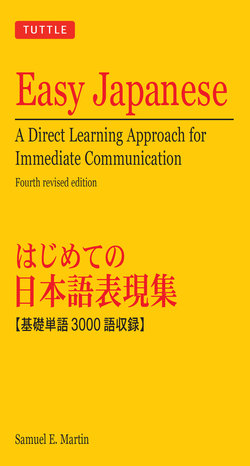Читать книгу Easy Japanese - Samuel E. Martin - Страница 9
На сайте Литреса книга снята с продажи.
ОглавлениеLESSON 2
Excuse me, Thank you, and Please
| Phrases | |
| Excuse me. (or Thank you.) | Sumimasen. (or Dōmo sumimasen. or Dōmo.) |
| Not at all. | Iie. (or Dō itashimash'te.) |
| Excuse me. | Gomen nasai. (or Gomen nasai ne.) |
| I've been rude. | Shitsure (i). (or Shitsurei shimash'ta.) |
| A little bit. | Chotto. |
| Excuse me a moment. | Chotto shitsurei. |
| Please wait a minute. | Chotto matte. (or Chotto matte kudasai.) |
| Please. | Dōzo. |
| Please come again. | Mata dōzo. |
| Thank you. | Arigatō. (or Arigatō goza imas'. or Dōmo arigatō.) |
| Hello—anybody home? | Gomen kudasai! (said at front door) |
| Practice | ||
| 1. | A: Sumimasen. | B: Iie. |
| 2. | A: Sumimasen. Dōmo. | B: Iie. Dōitashimash'te |
| 3. | A: Arigatō. Dōmo arigatō. | B: Iie, iie. |
| 4. | A: Chotto shitsurei. | B: Hai dōzo. |
| A: Sumimasen. | B: lie. | |
| 5. | A: Gomen kudasai! | B: Hai Konnichi wa. |
| A: Konnichi wa. Mister Brown? | B: Hai, dōzo. | |
| A: Shitsurei. | B: Dōzo, dōzo.... | |
| A: Dōmo sumimasen. | B: lie, shitsurei. Gomen nasai. | |
| A: Dōmo. Sayonara. | B: Sayonara. Mata dōzo. | |
| 6. | A: Moshi moshi. | B: Moshi moshi. |
| A: Ano ne. | B: Hai. | |
| A: Nikkatsu Hotel? | B: lie. | |
| A: Sumimasen. Dōmo. Gomen nasai. | B: lie. Dō itashimashite. Sayonara. | |
| A: Sayonara. | ||
| 7. | A: Moshi moshi. | B: Moshi moshi. |
| A: Ano ne. | B: Hai. | |
| A: Nikkatsu Hotel? | B: Hai. | |
| A: Sumimasen. Mister Clark? | B: Hai. hai. Chotto matte. Chotto shitsurei. Dōzo. | |
| 8. | A: Moshi moshi. | C: Moshi moshi. |
| A: Mister Clark? | C: Hai. | |
| A: Gomen nasai. Ano ne.... | ||
| A: Arigatō gozaimas'. | C: Dō itashimash'te. Shitsurei shimash'ta. | |
| A: lie. Dōmo sumi-masen. Sayonara. | C: Sayonara. Oyasumi nasai. |
Tips
The Japanese spend much of their time excusing themselves and thanking you. Perhaps this may strike you as a little silly at first, but if you play the game you will find it makes everybody feel very good. When Americans say “thank you” or “excuse me” it is one time at most— Japanese say them at least ONCE in every conversation, and usually TWO or THREE times. There are a great many different ways to say these things in Japanese; some are restricted to special situations. Whenever you feel something should be said, but don’t known quite what to say, try either Sumimasen or Dōmo —they cover everything. And be prepared to come back with Iie or Dō itashimash’te (or both) whenever someone says something nice to you. You will notice the Japanese do a lot of bowing from the waist. They don’t expect you to be quite so formal, but a humble bob of the head every now and then will show that your “excuse me” or “thank you” is more than an empty phrase.
| 1. | A: Excuse me. (or Thank you.) | B: Not at all. |
| 2 | A: Excuse me. Terribly sorry. (or Thank you. Ever so much.) | B: Not at all. Think nothing of it. |
| 3. | A: Thank you. Thanks a lot. | B: That's all right, think nothing of it. |
| 4. | A: Excuse me a minute. | B: Surely, go right ahead. |
| A: I'm sorry. | B: Not at all. | |
| 5. | A: Excuse me—anybody home? | B: Yes ("Coming—"). Good afternoon. |
| A: Good afternoon. (Are you) Mr. Brown? | B: Yes. Please (come in). | |
| A: Excuse me (for intruding). | B: Please, please (come right in).... | |
| A: Thank you ever so much. | B: Not at all, I've been rude. Excuse me. | |
| A: Thanks. Goodbye. | B: Goodbye. Please come again. | |
| 6. | A: Hello. | B: Hello. |
| A: Uh.... | B: Yes? | |
| A: (Is this the) Nikkatsu Hotel? | B: No. | |
| A: Sorry. Ever so sorry. Excuse me. | B: Not at all. Think nothing of it. Goodbye. | |
| A: Goodbye. | ||
| 7. | A: Hello. | B: Hello. |
| A: Uh.... | B: Yes? | |
| A: (Is this the) Nikkatsu Hotel? | B: Yes. | |
| A: Excuse me. (Is) Mister Clark (there)? | B: Yes sir. Wait just a minute. Excuse me a minute. Please (go ahead now). | |
| 8. | A: Hello. | C: Hello. |
| A: (Are you) Mister Clark? | C: Yes. | |
| A: Excuse me. Uh.... | ||
| A: Thank you. | C: Not at all. I've been rude. | |
| A: Not at all. Thank you (or excuse me) ever so much. Goodbye. | C: Goodbye. Goodnight. |
